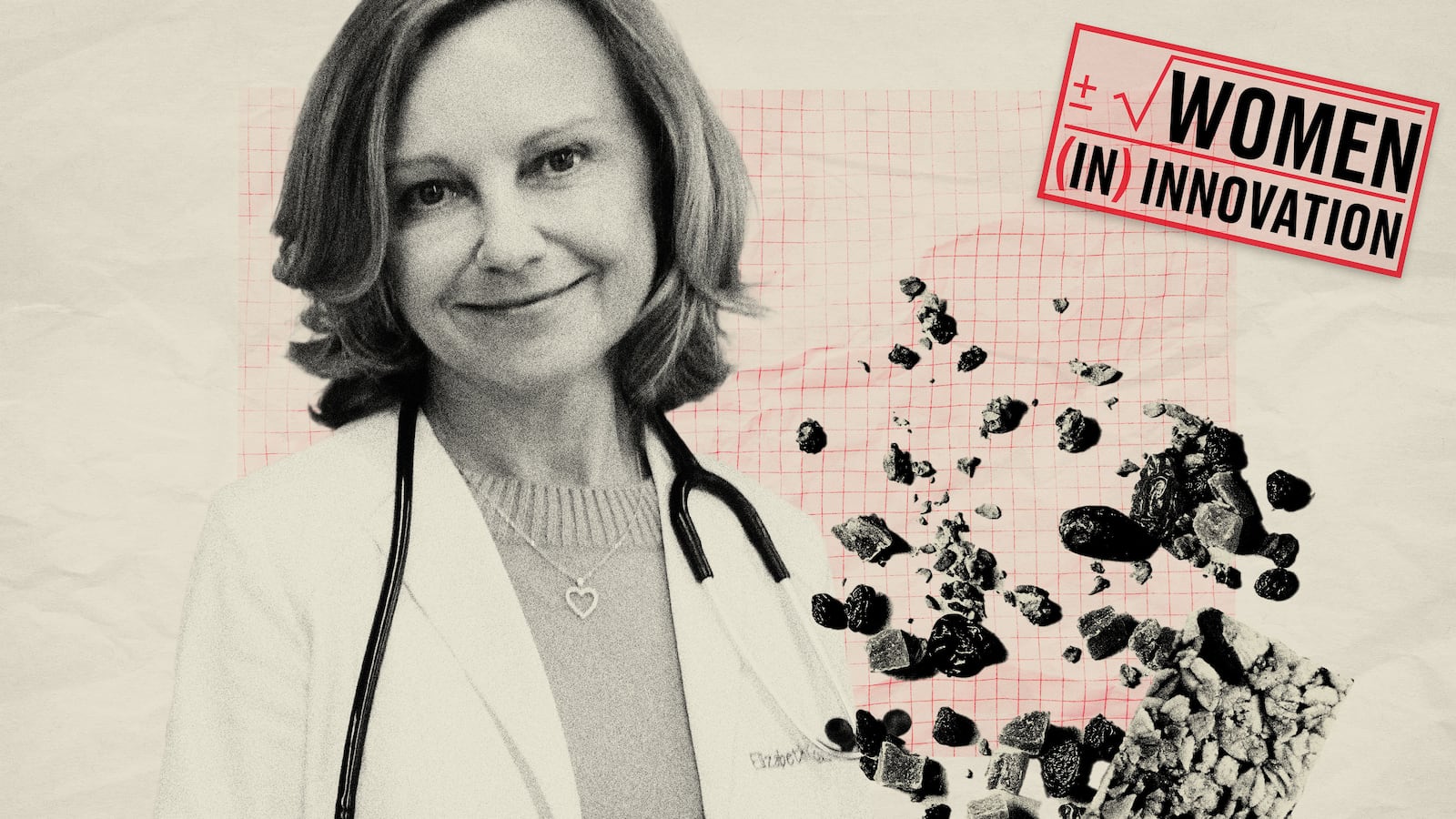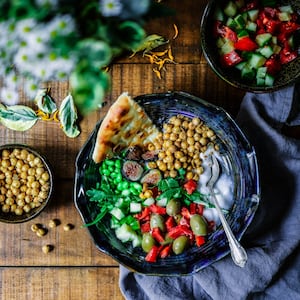More than a decade ago when her only nurse called in sick, Dr. Liz Klodas found herself standing in a part of her private cardiology practice in Edina, Minnesota, where she rarely ventured: the waiting room.
The patients she typically saw one-by-one now lined the perimeter of the fluorescent-lit room, sitting shoulder-to-shoulder. And the combined effect was staggering, even for someone who was well into the middle stages of her career practicing medicine.
Back in the exam room it was all numbers, comparing every stress test, weight or cholesterol reading to the one before. And she saw to it that all her patients’ numbers were fine, if not good. But in the waiting room there were no numbers, only people. People she’d been seeing for a long time sat slouched and despondent in their chairs, all overweight and obviously tired. Some rubbed aching joints. Others coddled swollen limbs. The numbers weren’t telling the whole story, and these people were nowhere near healthy. “It’s like I was an assembly line worker who finally looked up to see… the bigger picture,” Klodas told The Daily Beast.
Klodas started to ask her patients questions that weren’t typical for a visit to the cardiologist, like “what do you eat?” And she was shocked by their responses. One truck driver ate three meals a day from gas stations. Another patient drank a quart of orange juice a day because they thought it was healthy while another constantly ate canned soup for the same reason. “They all ate salt all day long,” Klodas said.
She started offering her patients nutritional counseling and referring them to dietitians, but it didn’t work. Eating healthy was a vague directive; life was too busy to commit to new dietary habits; and the grocery store was a land mine of temptation. For months, Klodas watched her patients try and fail to change things.
So she set out to make “eating healthy” easier—as easy as taking a pill. In her attempt to create a researched-back healthy snack for a few patients, Klodas developed a formula that could lower cholesterol as well as leading medication. Her many evenings spent researching and her weekend baking sessions turned into a large scale food manufacturing project, and eventually a brand: Step One Foods. The Minnesota cardiologist inadvertently became a pioneer in the movement to make food a true medical intervention—on the same level as how we might view prescription drugs.
The health and wellness industry has long promoted the vague all-encompassing healing powers of food-as-medicine—an ideal experience that seemed to be reserved for “yoga-practicing, vegan triathletes,” Klodas jeered. “We’ve all heard of food-as-medicine, but we’ve never realized it literally.” But Klodas isn’t after a cure-all. Her own approach to food-as-medicine is far more pragmatic and yet more challenging: a measurable improvement for sick people.
Test Kitchen
Some of Klodas’s closest friends joke that as the daughter of a primary care physician and a bakery owner, she was born to merge the two worlds that raised her. Her parents’ passions for food and medicine were central themes of her upbringing. Even after her family immigrated from Poland to Canada when she was 8, Klodas’ food environment always maintained a very old-world European influence, she said. Fresh food, home-cooked meals, simpler snacks, and garden-grown vegetables—these were her first lessons in food manufacturing.
But before she was mass producing health foods, Klodas was just a woman making her own granola after General Mills blew up her breakfast routine. One morning, her daily Raisin Bran tumbled out of the box with the raisins covered in sugar. She called the reformulation “sickeningly sweet” in the only customer complaint letter she’s ever written. The cereal giant, of course, was unmoved to backtrack on to its earlier recipe in response to just one customer’s grievance. Klodas decided to create her own no-sugar, whole food breakfast.
That morning granola side project was the perfect testing grounds for the nutrition research she’d pursue later on for her patients. She’d already been giving the granola to interested friends and family for years; some had even suggested she sell it. It was tasty, versatile and shelf stable, with no cooking required. Packaged in single servings, patients could just open, eat and enjoy. And she was quickly finding that there was solid research behind lowering cholesterol with foods like oat, oat bran and walnuts. She just had to put it all together. Ingredient by ingredient, she reformulated her breakfast staple into a medical treatment—unbeknownst to her.

Klodas (left) with Bill Bentz.
Courtesy Liz KlodasFrom Cardiologist to Food Entrepreneur
Around 2012, two years after the waiting room epiphany, Klodas had a product she could sell to a few patients. She’d taken on a business partner and rented space in an industrial kitchen. She called the packets of granola “Anytime Sprinkle,” and told her patients to add it to yogurt or oatmeal in the morning and have it as a snack in the afternoon. She never doubted it would be better for them than what they were eating. But the response blew her away: Her patients were seeing their cholesterol drop by a whopping average of 39 points. According to the Mayo Clinic’s Dr. Steve Kopecky, that’s the same impact of a statin, a medication that lowers cholesterol by working in the liver, where cholesterol is packaged and processed.
“I was mostly trying to get people to eat better. I’m not sure I set out to lower people's cholesterol in medication level amounts,” said Klodas. Granted, these findings were outside the purview of a clinical research investigation, but they nevertheless proved to Klodas that dramatic results were at least possible through novel food innovations.
She started developing more products with the same nutrient balance so patients would have some variety, cycling through two brand identities before she and her partner decided to do a final rebrand in 2016, as Step One Foods. The company began offering a suite of eight finalized products, including the sprinkle, a smoothie mix, a pancake mix, oatmeal and several bars. They also began marketing what they called the “Step One Challenge”: 30 days of eating Step One Foods twice a day.
They ramped up online advertising and the product spread by word of mouth. Bill Bentz, a retired fleet salesman in Minneapolis, saw a Step One ad on Facebook in Spring 2021. When his cholesterol measured a record high of 203, his doctor said statins were the only way. Bentz asked for six more months to try Step One as a last resort to avoiding pills. His cholesterol dropped to 159 by November with no other dietary changes.
“Part of my success is not knowing that I couldn’t,” Klodas said. Any manufacturing expert would have known that making fluffy pancakes from cholesterol-lowering ingredients or bars without added syrups were uphill battles, but Klodas said she just made what seemed best for patients. Manufacturers declined to ink deals with Step One. (On one occasion her chocolate bar formulation broke a machine during a test run.)

Step One Foods’ array of snacks, oatmeals, and sprinkles can lower cholesterol about as well as typical medication.
Courtesy Liz Klodas and Step One FoodsLiving Proof
While she fumbled through the ins and outs of food manufacturing, Klodas was also battling the judgmental gaze and raised eyebrows of her colleagues in medicine. “It was really looked down on by my peers,” she recalled. While the condemnation was rarely overt, there were frequent sneers about “Liz and her sprinkles.” Even when patients touted their positive results, her comrades viewed it as an outlier.
Proving them wrong—or simply proving the product worked to improve people’s health—would break the bank. The kind of research used to demonstrate that a drug, food or environmental factor causes a certain effect—called a randomized controlled trial—is extremely expensive. It’s no problem for pharmaceutical companies that have patents, high price tags and the offset of insurance coverage. But Klodas’ little food company had none of that. It couldn’t even afford to sell their products on third-party websites without losing money or becoming prohibitively expensive.
Klodas finally found a way to get some hard data thanks to a partnership with the Mayo Clinic and University of Manitoba. Together with the Richardson Center for Functional Foods and Nutraceuticals in Manitoba, Canada, Klodas and Kopecky pulled together a randomized clinical trial and enrolled 54 patients for a 12-week study. Half ate a Step One product twice a day for four weeks and the other half ate a single serving, packaged food of similar calorie count. Then after a four-week break, the group that originally had Step One ate control foods and the control group got Step One foods.
The original Step One group lowered their cholesterol by an average of 9 percent more than the control group in just four weeks. Some saw their cholesterol decrease by as much as 25 percent to 40 percent.
On average humans absorb about 55 percent of their cholesterol from the diet, Kopecky said, but some absorb much more and others much less. High absorbers, who absorb as much as 80 percent from their diet, see the most dramatic benefits from foods like Step One that block cholesterol uptake in the gut.
Every point that cholesterol is lowered reduces risk of heart attack or stroke by 1 percent, Kopecky said, referencing a 2008 study. A 9 percent drop in four weeks is could be profoundly beneficial to personal health in the long-run.

Pancakes made from Step One Foods’ specially-designed mix.
Courtesy Liz Klodas and Step One FoodsThe Healthcare Empire Strikes Back
Klodas doesn’t want to replace medication. She just wants her products to be on the “drop down menu” of treatment options for a patient with high cholesterol. But the growth of Step One into this space hinges on one thing: insurance coverage.
If Step One Foods are treated as a medical intervention and given partial or total insurance coverage, it would open up an entirely new market for food innovation and pit these companies directly against Big Pharma. Klodas hopes the new revenue stream could attract the investment and innovative power of major food companies to create more foods that make a measurable difference for patients with chronic kidney disease, cancer-related inflammation or those on dialysis.
Dr. Steven Peskin, the head of clinical innovations at BlueCross Blue Shield, told The Daily Beast that isn’t a far-fetched idea. Some over the counter products are eligible for HSA purchase. Insurance companies trying to get a competitive edge already offer some food and healthy grocery related benefits. So far, those benefits feature food as a preventative, whereas Klodas’ product is prescriptive. But she’s in good company as she tries to position food as a treatment. Nestle has already been in meetings with BlueCross Blue Shield, Peskin said, with questions similar to her own: What will it take for insurers to cover food like a medicine?
“Think about how much money we waste,” Klodas said. “[Insurers] are burning money paying people like me because 80 percent of heart disease need not exist.” Ironically, her goal in launching a food business like Step One Foods is essentially to make her medical practice bankrupt. “I should be out of work—that would be my greatest accomplishment.”


